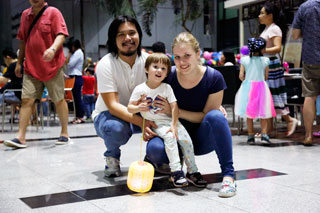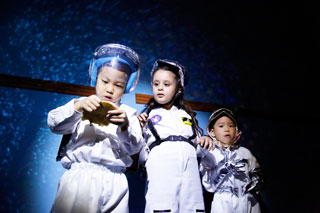Reaching For The Stars
December 20, 2018 | Campus News
It is often said that learning should go beyond the classroom. But how far should one go?
At UCSI’s Child Development Centre (CDC), many enthusiastic children would say: To the moon and back.
While this isn’t meant to be taken literally, it isn’t entirely an exaggeration either. Not when you see students dressing up in astronaut suits, armed with life-saving packs and replica oxygen tanks.
Heading into the dark room that resembles the vast expanse of a night sky when the stars are hidden, the excited children suddenly find themselves amidst the constellations as a map of the universe is projected against the walls.
Re-enacting moon landings and space expeditions, they learn about the solar system, the characteristics of each planet and science experiments that astronauts conduct in space, before trying their hand at some simpler tests.
Soaking in the experience, the children see to the tasks at hand and some proceed to ask how rockets are created, what astronauts eat and whether they can experience a situation with zero gravity.
Learning never felt this fun.
According to Dr Chiah Wan Yeng, a child psychologist and the CDC’s head of academic affairs, themed lessons like My Universe, My Way are a good platform to see contextual learning in action.
“Through constructivism and learning through play, children put theory into practice freely, making sense of the subject before them and internalising knowledge based on their experiences,” she enthuses.
“Our students clearly enjoy learning and we see them interacting a lot more with their teachers and asking many questions that are related to lessons. This active engagement shows us how effective contextual learning is and we ended up allocating and entire day of the week to focus on it.”
That magic day is Friday and students dress accordingly for the occasion, according to the theme of the day. Main themes like My Universe, My Way run for two months with sub-themes each week to keep lessons fresh.
“We find out that our students performed much better ever since we implemented contextual learning in a big way,” continues Dr Chiah. “Formal learning takes place from Monday to Thursday and this period now serves as the build-up to Friday where our students apply what they learn.

“Not many preschool centres have adopted contextual learning so the CDC stands out for advocating a system that brings out the best in children without stressing them out. Through increased participation, our students can even function as co-creators in the lessons they learn.”
Dr Chiah refers to the question of zero gravity as a good case in point. Thanks to popular demand, the CDC teachers decided to grant the students their wish by organising an excursion to Planetarium Negara.
The anti-gravity room there answered any lingering questions on how astronauts move around in space and the students had a hard time standing up straight. All in good fun though.
Dr Chiah’s assessment on the effectiveness of contextual learning is shared by many parents like Karolina Greiner who enrolled her son, Hendryk Bjorn Ly, at the CDC.
“Contextual learning sessions at the CDC offer a unique opportunity for students to learn about processes that are related to real life situations,” says Greiner who hails from Poland.
“I feel that it’s a very effective way of learning from experiences. My son really enjoys it and it’s good to see him applying his lessons from class into a real life context.”
Another parent, Alice Chiew, says that the CDC’s emphasis on contextual learning has a positive correlation with her son’s memory.
“As a parent, I fully support the CDC’s approach in implementing engaging teaching methods that bring out the best in children,” she said.
Reaching the end of its lifecycle, the universe-themed approach will now make way for a zoo-like and nature-inspired theme that focuses on wildlife and the ecosystem.
Dr Chiah opines that the children are looking forward to the new theme and the CDC invests much time in planning to ensure each theme will be inspiring.
She adds that a major upgrade is also in the works. This will see the installation of thematic labs, a contextual room for music and movement, purpose-built spaces for speech and drama as well as a better lab for kinder cooking.
The upgrades cost around RM1mil and with this in mind, the CDC stands out as the go-to place in Cheras for parents who want an ideal start for their children.
View Other categories: NATIONAL | CAMPUS | ACHIEVEMENT | EDITOR'S DESK
























